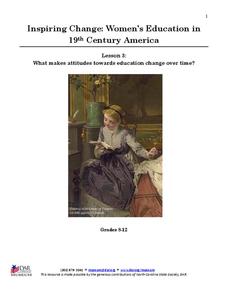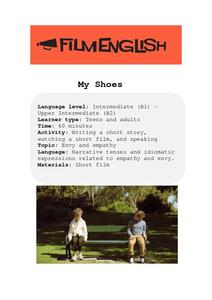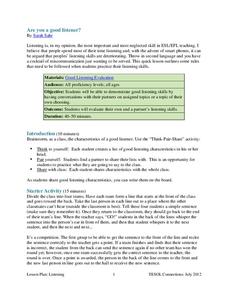Roald Dahl
Roald Dahl Matilda Lesson Plans
Fifty eye-catching pages contain six lessons about Roald Dahl's novel, Matilda. Each lesson has a theme and covers a different subject—literacy, social-emotional learning, science, and geography. Scholars analyze characters, examine...
EngageNY
Grade 9 ELA Module 3, Unit 1, Lesson 1
Clear up the misconceptions about autism and individuals on the autism spectrum with an inquiry-based instructional activity. As ninth graders read the first four pages of Temple Grandin's Animals in Translation: Using the Mysteries of...
Museum of Disability
Don't Laugh at Me
You can prevent bullying in your classroom by addressing kindness, empathy, and acceptance with your littlest learners early on. After reading Don't Laugh at Me by Steve Seskin and Allen Shamblin, kids discuss the ways that words can...
Museum of Disability
Stand Tall, Molly Lou Melon
Help to create the next generation of friends with a lesson about accepting people who are different. As kids read Stand Tall, Molly Lou Melon, they answer a series of discussion questions and activities about making friends with others.
Teaching Tolerance
Constructively Engaging in Digital Communities
Say no to hate speech! Pupils discover the importance of practicing empathy and inclusivity in digital communities and discuss strategies for responding to online hate speech. Then, small groups develop and present class guidelines for...
Museum of Disability
Can You Hear a Rainbow?
Teach your class about compassion and empathy with Jamee Riggio Heelan's Can You Hear a Rainbow? As kids read about Chris, a boy who is deaf, they discuss the things he likes to do, as well as the ways he communicates with the world.
National Society Daughters of the American Revolution
Lesson 3: What Makes Attitudes Towards Education Change over Time?
The struggle for women's rights is not unique to this generation, or even to the 20th century. Class members explore the conflicting opinions of Alexander Graham Bell and his wife, Mabel Hubbard Bell, regarding women's pursuits of higher...
Museum of Disability
A Picture Book of Louis Braille
Teach kids about the beginnings of the Braille writing system with a lesson about Louis Braille. A series of discussion questions guide young readers though A Picture Book of Louis Braille by David A. Adler, and once they finish the...
Film English
My Shoes
Engage your pupils in short story and short film. Using a still from the film as inspiration, pairs compose short stories, which they later share and compare with other members of the class. They then watch the film and respond to a...
Daughters of the American Revolution
Lesson 2: How Do We Determine the Value of Education?
Have women always had the same educational opportunities as their male counterparts? Young historians read an 1819 essay by Emma Willard on the state of female education in the 19th century before discussing their views regarding women's...
TESOL
Are You a Good Listener?
Your learners talk to each other every day, but are they really listening? Use a lesson based on listening skills to ensure that class members feel heard and respected. It includes games, discussion topics, and self-assessment tools that...
National Endowment for the Humanities
“The Great Migration” by Minnie Bruce Pratt
Minnie Bruce Pratt's poem, "The Great Migration," offers young scholars an opportunity to reflect on how where we come from influences who we are. Groups conduct a close reading of the poem, recording observations about the poem's...
Curated OER
Alexander and the Terrible, Horrible, No-Good, Very Bad Day
Second graders interact with the story of Alexander's horrible day by connecting it to their lives. They practice predicting, writing paragraphs, reading aloud, discussing his problems, making a card to cheer him up, and designing a pair...
Teaching Tolerance
Understanding the Prison Label
Break the chain. An engaging lesson examines why it is so hard to break free of the prison system in the US. Academics participate in a reader's theater, read primary sources, and discuss their thoughts. The lesson explains the hardships...
Curated OER
100 Questions
Students practice problem solving skills by asking questions and participating in a design challenge. In this asking questions lesson, students work in pairs to ask questions to design a solution for a difficult personal problem....
Curated OER
Teach Peace Now
Help your learners discover empathy and understanding by investigating two sides of a situation. In this humanities lesson, pupils examine different pairs of shoes and hypothesize about who may have worn them. Discuss real life...
Curated OER
Are You the Master of Your Fate?
Use contemporary nonfiction in order to develop empathy and examine the power an individual has over his destiny.
Simon & Schuster
Curriculum Guide to: Great Expectations by Charles Dickens
Great Expectations can prove to be a challenge for instructors who choose to use Dickens's novel as required reading. Here's a curriculum guide that includes lessons that address some of these challenges. The first lesson in critical...
Folger Shakespeare Library
Essential Everyday Bravery
Shakespeare's plays may be old, but they still have relevant lessons for today's world! A collection of lesson plans uses examples from The Merchant of Venice and District Merchants to teach about bravery. In addition to learning...
Museum of Disability
Don't Call Me Special
Introduce young learners to the idea of disabilities and making friends with children who are different than they are. Using Don't Call Me Special - A First Look at Disability by Pat Thomas, learners are guided through the new vocabulary...
Humane Education Advocates Reaching Teachers
Justice for All - Educating Youth for Social Responsibility: Grades 6-8
Teach middle schoolers how to develop healthy relationships with activities and lessons designed to create a kind and inclusive
classroom. Pupils create guidelines to develop a safe and civil learning environment. They learn how to...
Museum of Disability
Stand in My Shoes
Stand in My Shoes, a story by Bob Sornson, is an effective way to teach young learners about empathy and making friends. Once pupils read through the story, they answer a series of discussion questions and complete reading activities...
Museum of Disability
Rolling Along
Kindness and empathy can be as important as reading comprehension skills, especially for younger learners. Reinforce both with a instructional activity based on Rolling Along: The Story of Taylor and His Wheelchair by Jamee Riggio...
Curated OER
Health Education: An Integrated Approach; A Day Without Sight
Fourth graders hypothesize about the difficulties they may encounter if they did not have their sense of sight, in order to establish a sense of empathy for the disabled. In this lesson on senses, 4th graders record all of the things...

























